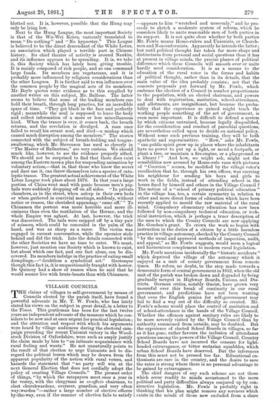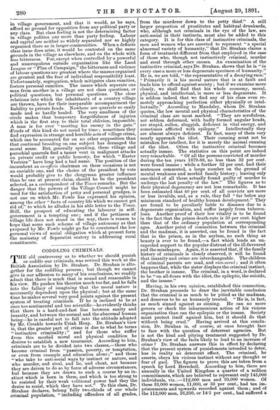VILLAGE COUNCILS. T HE claims of villages to self-government by means
of Councils elected by the parish itself, have found a powerful advocate in Mr. T. W. Fowle, who has lately stated his views on the subject in great detail, in a letter to the Times. This gentleman has been for the last twelve years an independent advocate of the measure which he con- siders to be now and at once urgent for practical legislation; and the attention and respect with which his arguments were heard by village audiences during the electoral cam- paign preceding the recent Unionist victory in the Wood- stock Division of Oxfordshire, were such as amply justify the claim made by him to "an intimate acquaintance with rural feeling and wants." He not unnaturally points to the result of that election to urge Unionists not to dis- regard the political lesson which may be drawn from the apparent popularity of the notion with rural voters, and hazards the statement that " no party will win at the next General Election that does not cordially adopt the policy of creating Village Councils." The present order of things, "by which the ratepayers meet once a year in the vestry, with the clergyman as ex-officio chairman, to elect churchwardens, overseer, guardian, and very often way-warden "—rather a large number of elective officers by-the-way, even if the manner of election fails to satisfy —appears to him "wretched and unseemly," and he pro- ceeds to sketch a moderate system of reform, which he considers likely to unite reasonable men of both parties in its support. It is not quite clear whether by both parties Mr. Fowle means Home-rulers and Unionists, or Church- men and Nonconformists. Apparently he intends the latter ; but until political thought has taken far more shape and distinctness from personal and social questions than it has at present in village minds, the precise phases of political difference which these Councils will smooth over or unite hardly need consideration. It is as a means to the education of the rural voter in the forms and habits of political thought, rather than in its details, that the main value of the idea probably consists ; not that the concrete proposals put forward by Mr. Fowle, which embrace the election of a Council in number proportionate to the population, with an elected chairman, and powers to deal with registration, sanitation, school-attendance, and allotments, are insignificant, but because the proba- bility that the experience so gained might teach the working people something of the art of government, is even more important. It is difficult to defend a system by which citizens untrained, because legally disqualified, for the consideration and conduct of parochial questions, are nevertheless called upon to decide on national policy. Without some such previous training, they will be both apathetic and supersensitive. " How," asks Mr. Fowle, " can public spirit grow up in places where the inhabitants have no power to put up a light, or mend a footpath, or plant a tree, or maintain a fire-engine, or a playground or a library ? " And how, we might ask, might not the sensibilities now aroused by Home-rule vans with pictures of " Coercion " scenes, be modified by the village voter's recollection that he, through his own officer, was coercing his neighbour for sending his boys and girls to work in the fields, instead of attending school in the hours fixed by himself and others in the Village Council ? The notion of a " school of primary political education " in the village has, too, a certain symmetry iu relation to other and more direct forms of education which have been recently applied to mould the raw material of the rural mind. Compulsory elementary education has now been followed by non-compulsory technical education, or tech- nical instruction, which is perhaps a truer description of the uses to which the County Councils are now applying Mr. Goschen's grant. To crown the work so begun with instruction in the duties of a citizen by a little harmless practice in village autonomy, checked by the County Council " by the usual and approved methods of inspection, audit, and appeal," as Mr. Fowle suggests, would seem a logical and harmonious complement to modern rural legislation.
Mr. Fowle mentions incidentally the " historic accidents " which deprived the village of the autonomy which it enjoyed as a unit of county government from remote times. He refers, no doubt, to the step made towards a democratic form of central government in 1832, when the old unit of the parish was broken down and degraded by being gradually merged in Highway Boards, Unions, and Dis- tricts. German critics, notably Gneist, have grown very mournful over this break of continuity in our rural government, and predictions have not been wanting that even the English genius for self-government may fail to find a way out of the difficulty so created. Mr. Fowle's scheme would place the control of sanitation and of school-attendance in the hands of the Village Council. Whether the offences against sanitary rules are likely to be more severely visited by the Village Council than by authority summoned from outside, may be doubted. But the experience of elected School Boards in villages, so far as it has gone, rather favours the inclusion of attendance questions among the powers of the Village Council. Country School Boards have not incurred the censure for light- headed extravagance, or bitter sectarian squabbles, which urban School Boards have deserved. But the inferences from this must not be pressed too far. Educational en- thusiasts are rare in the country, and the desire to save the rates is strong where there is no personal advantage to be gained by extravagance.
The chief dangers of any such scheme are not those which occur readily to minds accustomed to the mere. political and party difficulties always conjured up by con- structive legislation. Mr. Fowle is probably right in thinking that his plan might remove any soreness which exists in the minds of those now excluded from a share in village government, and that it would, as he says, afford no ground for opposition from any political party or any class. But class feeling is not the determining factor in village politics any more than party feeling. Labour and capital are neither so widely separated nor so highly organised there as in larger communities. When a definite class issue does arise, it would be contested on the same grounds in the village as elsewhere, and on the whole with less bitterness. For, except when controlled by a powerful and unscrupulous outside organisation like the Land League or " Plan of Campaign," the bitterness and violence of labour questions are greatest where the masses organised are greatest and the fear of individual responsibility least. Unfortunately, segregation, which mitigates class enmities, fosters personal enmities. The issues which separate one 'man from another in a village are not class questions, or political questions, but personal questions. The close relations into which the inhabitants of a country village are thrown, have for their inseparable accompaniment the liability to private feuds. Nowhere are quarrels so easily 'made and so hardly healed. The very smallness of the 'circle makes that temporary forgetfulness of injuries which is the first step to their total oblivion, impossible. A man is for ever " meeting his enemy in the gate." !Feuds of this kind do not mend by time ; sometimes they find expression in strange and horrible acts of village crime, which can be accounted for on no other supposition than that continual brooding on one subject has deranged the moral sense. But, generally speaking, these village and parochial quarrels find a tamer vent in malignant attacks on private credit or public honesty, for which " Easter Vestries" have long had a bad name. The position of the 'incumbent as ex-officio chairman on these occasions is not an enviable one, and the choice of the president by vote would probably give to the clergyman greater influence than he can at present claim, should he be the president selected, as a correspondent of the Times remarks. But the danger that the powers of the Village Council might be used for the satisfaction of petty and personal grudges, is .not one on which Mr. Fowle has expressed his opinion, -among the other " facts of country life which we cannot get rid of," to which he alludes in his able letter to the Times. Still, the prospect of educating the labourer in self- government is a tempting one ; and if the pettiness of village life does not stand in the way, there is reason to tope that some such scheme of village autonomy as that proposed by Mr. Fowle might go far to counteract the low ,personal views of social obligation which at present form the mainstay of Separatist oratory in addressing rural constituents.



































 Previous page
Previous page